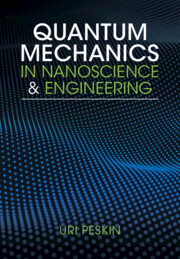Book contents
- Quantum Mechanics in Nanoscience and Engineering
- Additional material
- Quantum Mechanics in Nanoscience and Engineering
- Copyright page
- Contents
- Preface: Who Can Benefit from Reading This Book?
- 1 Motivation
- 2 The State of a System
- 3 Observables and Operators
- 4 The Schrödinger Equation
- 5 Energy Quantization
- 6 Wave Function Penetration, Tunneling, and Quantum Wells
- 7 The Continuous Spectrum and Scattering States
- 8 Mechanical Vibrations and the Harmonic Oscillator Model
- 9 Two-Body Rotation and Angular Momentum
- 10 The Hydrogen-Like Atom
- 11 The Postulates of Quantum Mechanics
- 12 Approximation Methods
- 13 Many-Electron Systems
- 14 Many-Atom Systems
- 15 Quantum Dynamics
- 16 Incoherent States
- 17 Quantum Rate Processes
- 18 Thermal Rates in a Bosonic Environment
- 19 Open Quantum Systems
- 20 Open Many-Fermion Systems
- Index
- References
9 - Two-Body Rotation and Angular Momentum
Published online by Cambridge University Press: 11 May 2023
- Quantum Mechanics in Nanoscience and Engineering
- Additional material
- Quantum Mechanics in Nanoscience and Engineering
- Copyright page
- Contents
- Preface: Who Can Benefit from Reading This Book?
- 1 Motivation
- 2 The State of a System
- 3 Observables and Operators
- 4 The Schrödinger Equation
- 5 Energy Quantization
- 6 Wave Function Penetration, Tunneling, and Quantum Wells
- 7 The Continuous Spectrum and Scattering States
- 8 Mechanical Vibrations and the Harmonic Oscillator Model
- 9 Two-Body Rotation and Angular Momentum
- 10 The Hydrogen-Like Atom
- 11 The Postulates of Quantum Mechanics
- 12 Approximation Methods
- 13 Many-Electron Systems
- 14 Many-Atom Systems
- 15 Quantum Dynamics
- 16 Incoherent States
- 17 Quantum Rate Processes
- 18 Thermal Rates in a Bosonic Environment
- 19 Open Quantum Systems
- 20 Open Many-Fermion Systems
- Index
- References
Summary
The quantum mechanical two-body problem is analyzed. Separating the center of mass from the relative motion Hamiltonian and focusing on “central potentials,” the stationary Schrödinger equation for the relative motion in spherical coordinates is split into radial and angular equations. The universal angular equation is identified as the eigenvalue equation of the angular momentum operator, whose proper solutions are the spherical harmonics. For fixed interparticle distance, the two-body system is mapped on a “rigid rotor” Hamiltonian, whose eigenstates coincide with the angular momentum eigenstates. In diatomic molecules, timescale separation between fast vibrations (radial motion) and slow rotations (angular motion) enables one to invoke a rigid rotor approximation for interpreting rotational absorption spectrum in the microwave regime. Deviations from the predictions of the rigid rotor model and their manifestation in experiments are analyzed by explicit solution of the stationary Schrödinger equation for two particles in the presence of vibration–rotation coupling.
Keywords
- Type
- Chapter
- Information
- Quantum Mechanics in Nanoscience and Engineering , pp. 88 - 105Publisher: Cambridge University PressPrint publication year: 2023

